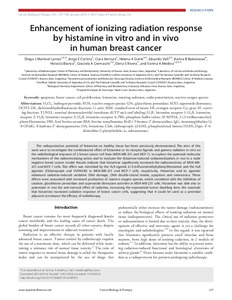Please use this identifier to cite or link to this item:
https://repositorio.uca.edu.ar/handle/123456789/8725| Título: | Enhancement of ionizing radiation response by histamine in vitro and in vivo in human breast cancer | Autor: | Martinel Lamas, Diego J. Cortina, Jorge E. Ventura, Clara Sterle, Helena Andrea Valli, Eduardo Balestrasse, Karina B. Blanco, Horacio Cremaschi, Graciela A. Rivera, Elena S. Medina, Vanina Araceli |
Palabras clave: | MEDICINA; ONCOLOGIA; CANCER DE MAMA; HISTAMINA; RADIACION IONIZANTE; PROLIFERACION CELULAR | Fecha de publicación: | 2015 | Editorial: | Taylor & Francis Group | Cita: | Diego J Martinel Lamas, Jorge E Cortina, Clara Ventura, Helena A Sterle, Eduardo Valli, Karina B Balestrasse, Horacio Blanco, Graciela A Cremaschi, Elena S Rivera & Vanina A Medina (2015) Enhancement of ionizing radiation response by histamine in vitro and in vivo in human breast cancer [en líena]. Cancer Biology & Therapy, 16:1, 137-148, DOI: 10.4161/15384047.2014.987091. Registro en: https://repositorio.uca.edu.ar/handle/123456789/8725 | Resumen: | Abstract: The radioprotective potential of histamine on healthy tissue has been previously demonstrated. The aims of this work were to investigate the combinatorial effect of histamine or its receptor ligands and gamma radiation in vitro on the radiobiological response of 2 breast cancer cell lines (MDA-MB-231 and MCF-7), to explore the potential molecular mechanisms of the radiosensitizing action and to evaluate the histamine-induced radiosensitization in vivo in a triple negative breast cancer model. Results indicate that histamine significantly increased the radiosensitivity of MDA-MB- 231 and MCF-7 cells. This effect was mimicked by the H1R agonist 2-(3-(trifluoromethyl)phenyl)histamine and the H4R agonists (Clobenpropit and VUF8430) in MDA-MB-231 and MCF-7 cells, respectively. Histamine and its agonists enhanced radiation-induced oxidative DNA damage, DNA double-strand breaks, apoptosis and senescence. These effects were associated with increased production of reactive oxygen species, which correlated with the inhibition of catalase, glutathione peroxidase and superoxide dismutase activities in MDA-MB-231 cells. Histamine was able also to potentiate in vivo the anti-tumoral effect of radiation, increasing the exponential tumor doubling time. We conclude that histamine increased radiation response of breast cancer cells, suggesting that it could be used as a potential adjuvant to enhance the efficacy of radiotherapy. | URI: | https://repositorio.uca.edu.ar/handle/123456789/8725 | ISSN: | 1538-4047 (impreso) 1555-8576 (online) |
Disciplina: | MEDICINA | DOI: | 10.4161/15384047.2014.987091 | Derechos: | Acceso abierto | Fuente: | Cancer Biology & Therapy Vol. 16, N° 1, 2015 |
| Appears in Collections: | Artículos |
Files in This Item:
| File | Description | Size | Format | |
|---|---|---|---|---|
| enhancement-ionizing-radiation.pdf | 885,08 kB | Adobe PDF |  View/Open |
This item is licensed under a Creative Commons License

